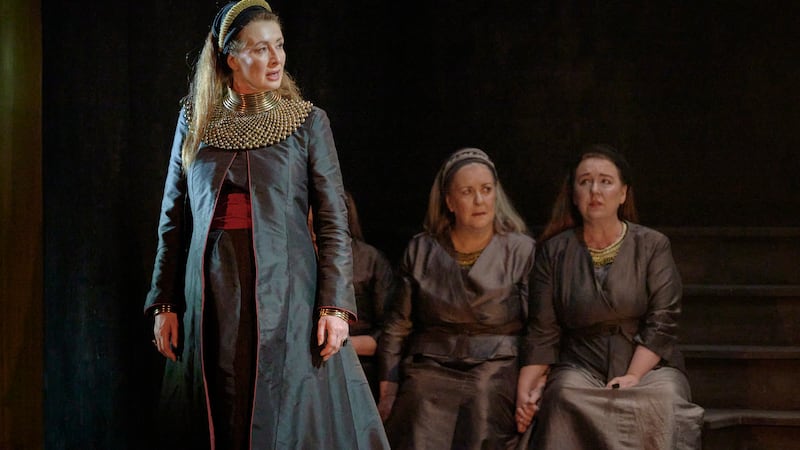Go mbeannaí Dia daoibh agus bhur gcéad míle fáilte isteach chuig the Bluffer’s Guide to Irish.
Well, after the trip to Croker last week, it’s time to get the nose to the grindstone with another irregular verb.
A lot of the irregular verbs deal with na céadfaí - the senses and today we’ll look at what you can see.
We’ll deal with the main tenses - the present habitual tense (don’t worry about the big words, it’s just the Bluffer showing off) is when you do things on a regular (habitual) basis ie I get up at 7am, I have a shower, I watch Only Connect on iplayer etc.
The past tense does exactly what it says on the tin, it’s saying what you did in the past - I bought a nose hair clipper, he fell down the toilet, that sort of thing.
The future tense is when you tell people what will happen - they will tidy my room, you shall go to the ball, etc.
So the verb feic, to see in the present habitual tense, it’s feicim - I see, feiceanntú/sé/sí/muid/sibh/siad.
So feicim Seán gach Aoine - I see Sean every Friday; feiceann siad an síceolaí uair sa mhí - they see the psychologist once a month.
Now, in the negative, you would say ní fheicim - I don’t see and ní fheiceann tú/sé/sí/muid/sibh/siad.
There is more change when you are asking a question and that changes to an/go/nach bhfeicim and an/go nach bhfeiceann tú/sé/sí/muid/sibh/siad.
Nach bhfeiceann tú go bhfuil an ceart agam? Don’t you see I’m right?
An bhfeiceann tú Síle go minic? Do you see Sheila often?
Now, most Irish speakers when asking a question like the one above will leave out the word an at the beginning and just say “bhfeiceann tú Síle go minic?”
Right let’s move swiftly onto the past tense.
Chonaic mé, ní fhaca mé an/go/nach bhfaca mé.
You can change mé to tú, sé, sí, muid, sibh or siad etc when you are making up sentences and you will be able to build up something like a real conversation.
An bhfaca tú an cluiche inné? - Did you see the game yesterday? Ní fhaca? I didn’t.
(Again, when asking a question I’d advice leaving out the an at the beginning when you are speaking but always keep it in if you are writing in Irish.)
You can practice this by replacing an cluiche with the name of a TV programme so an bhfaca tú Eastenders, The Sunday Game, Embarrasing Bodies, Celebrity Big Brother, etc, etc.
Back to the future now - are yez ready? Here it is feicfidh, ní fheicfidh an/go/nach bhfeicfidh.
An bhfeicfidh mé anochttú? - Will I see you tonight? is what you can ask the boy/girl you really fancy.
Ní fheicfidh - you won’t – or more precisely, no way Jose –might be the earth-shattering reply.
Now, you are right, dear long-suffering fans of the Bluffer, there is a lot to take in there.
The advice would be to break it down into bits, start off with the present tense, learn it off by heart, look up other grammars on the internet or in books, go to classes, do a bit of revision over a skinny latte or a pint of Oyster stout or on the bus, and before you know it, it will feic this and feic that!
CÚPLA FOCAL
na céadfaí (ne caydfwee) - the senses
feiceanntú/sé/sí/muid/sibh/siad (feckin too/shay/she/midge/shiv/shade) - you/he/she/we/you/they see
feicim Seán gach Aoine(feckim shaan gakh aynya) - I see Sean every Friday
feiceann siad an síceolaí uair sa mhí (feckin shade un shickolee oor sa vee) - they see the psychologist once a month
ní fheicim (nee eckim) - I don’t see
ní fheiceann tú etc (nee eckin too... ) - you etc don’t see
an/go/nach bhfeicim(un/gaw/nakh veckim) - do I see etc.
an/go/nach bhfeiceann tú etc.- (un/gaw/nakh veckin too) - do you etc see
Nach bhfeiceann tú go bhfuil an ceart agam? - (nakh veckin too gaw wil un kyart ugum) Don’t you see I’m right?
An bhfeiceann tú Síle go minic? - (un vechin too sheela gaw minick) Do you see Sheila often?
An bhfaca tú an cluiche inné?(un waca too un cleeha inyay) - Did you see the game yesterday?
Ní fhaca?(nee aca) - I didn’t.
An bhfeicfidh mé anochtthú? (un veckee may anokht hoo) - Will I see you tonight?
Ní fheicfidh(nee eckee - you won’t


